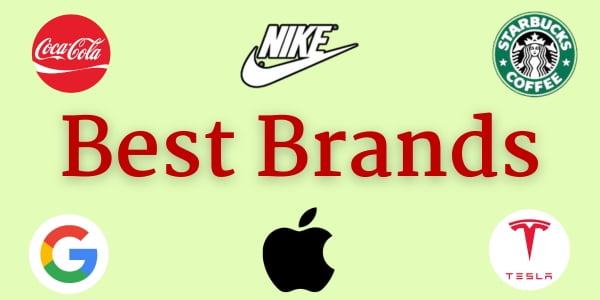7 Steps with 7 Examples of Excellent Brand Strategy
Successful brands don't achieve greatness through mere chance; rather, their success results from a blend of various factors, with brand strategy playing a pivotal role.
To establish yourself as a distinctive, unparalleled, and memorable brand within your target audience, there's ample opportunity to draw inspiration from renowned brands and craft your unique strategy based on their successful models.
We've analyzed some of the most accomplished brands and distilled their unique strategies to highlight the primary elements contributing to their success.
However, before we delve into unveiling these influential brands, let's first understand what constitutes a brand strategy.
What is a Brand Strategy?
In the dynamic landscape of business, a robust brand strategy is imperative for sustainable growth and market relevance, according to vantagebranding.com.sg.
Basically, a brand strategy is:
- A comprehensive plan that defines a company’s identity, values, and market positioning
- More than just a logo or tagline; it’s a roadmap for building trust and recognition

Step to Follow for Online Branding
A well-crafted brand plan goes beyond a logo or tagline; it's a comprehensive roadmap that defines a company's identity, values, and positioning in the market.
- Brand Identity
- Target Audience Analysis
- Unique Value Proposition (UVP)
- Brand Positioning
- Messaging and Communication
- Brand Experience
- Brand Consistency
Let me guide you about these all seven steps in detail.
1. Brand Identity
At the core of any brand strategy lies a distinct brand identity. This encompasses the visual elements, such as logos, color schemes, and image editing, that create immediate recognition. Consistency in these elements fosters brand recall, building trust and familiarity among consumers.
- Use logos, colors, and fonts that match your values
- Be consistent with visuals across all platforms
- Create a unique style that stands out
- Keep it simple and memorable
2. Target Audience Analysis
Understanding the demographics, psychographics, and behaviors of the target audience is pivotal. A brand strategy must align with the preferences and needs of the intended market, ensuring that every aspect of the brand resonates with its audience.
- Studying their age, gender, and location
- Learning their interests, habits, and values
- Asking what problems they need solving
- Focusing on their needs and preferences
3. Unique Value Proposition (UVP)
A brand's UVP articulates what sets it apart from competitors.
Clearly defining the unique value that the corporation offers helps in creating a compelling narrative that resonates with its consumers. This aspect becomes the driving force behind marketing and communication efforts.
- Highlighting your strengths and benefits
- Explaining why customers should choose you
- Making it simple and easy to understand
- Creating a story that connects emotionally

4. Brand Positioning
Effective brand positioning is about occupying a distinct space in the minds of consumers. This involves defining how a brand wants to be perceived in relation to competitors. A well-crafted positioning strategy guides all communication, ensuring a consistent and differentiated brand image.
- Finding what your competitors miss
- Defining how you want customers to see you
- Building a unique voice for your brand
- Staying consistent in all messages
5. Messaging and Communication
Crafting a compelling brand message is pivotal in conveying the brand's values and benefits. Consistent messaging across various channels, including advertising, social media, and customer interactions, strengthens the brand's narrative, fostering a cohesive and recognizable image.
- Creating a tagline that reflects your values
- Using the same tone across all platforms
- Sharing content that engages and informs
- Keeping your message simple and relatable
6. Brand Experience
The brand experience extends beyond the product or service to encompass every interaction a customer has with the brand.
From website navigation to customer service, a positive and cohesive brand experience builds customer loyalty and enhances the overall perception of the brand.
- Designing a user-friendly website
- Ensuring great customer service
- Offering consistent quality in products/services
- Personalizing interactions with customers
7. Brand Consistency
Consistency is key to a successful brand strategy. From visual elements to communication tone, maintaining a unified brand image across all touchpoints fosters trust and reliability. Consistency reinforces the brand's identity, making it easily recognizable and memorable.
- Your logo, colors, and fonts
- Your tone and style in communication
- Your marketing efforts across all channels
- The overall message of your brand
Examples of Excellent Branding
In such a competitive business landscape, a robust brand strategy is crucial for sustained success.
These examples showcase how companies have masterfully crafted and executed brand strategies, setting them apart in their respective industries.

1. Apple: Seamless Ecosystem Integration
Apple's brand strategy revolves around seamless integration across its product ecosystem. From iPhones to MacBooks, the user experience is consistently intuitive.
This cohesive approach fosters brand loyalty and distinguishes Apple as a tech giant that prioritizes user convenience.
2. Nike: Emotional Branding Through Inspirational Messaging
Nike's brand strategy goes beyond products, focusing on emotional connections.
Their iconic "Just Do It" campaign inspires consumers, positioning Nike as a symbol of empowerment. This emotional resonance has made Nike a leader in athletic apparel, transcending mere functionality.
3. Starbucks: Creating a Unique Customer Experience
Starbucks excels in creating a distinct customer experience. Beyond their coffee, Starbucks offers a welcoming ambiance, personalized service, and a sense of community.
This brand strategy transforms a simple cup of coffee into a lifestyle choice, fostering customer loyalty.
4. Tesla: Disruptive Innovation and Sustainability
Tesla's brand strategy revolves around disruptive innovation and sustainability. By leading the electric vehicle revolution, Tesla positions itself as an industry pioneer.
The brand communicates not only cutting-edge technology but also a commitment to a greener future, resonating with environmentally conscious consumers.
5. Coca-Cola: Consistent Branding Across Cultures
Coca-Cola's brand strategy is a global success story.
With consistent branding and messaging across diverse cultures, languages, and markets, Coca-Cola has achieved universal recognition. This approach ensures that the brand remains iconic and relevant worldwide.

6. Airbnb: Community-Centric Branding
Airbnb's brand strategy centers on community and belonging.
Through nice user-generated content, personal stories, and a focus on accommodations, Airbnb creates a sense of community among hosts and guests. It positions Airbnb as more than just a booking platform but a facilitator of meaningful connections.
7. Google: User-Centric Innovation
Google's brand strategy is synonymous with user-centric innovation.
By prioritizing user experience and constantly evolving products, Google maintains its position as a tech giant. The brand's consistent commitment to simplicity, functionality, and cutting-edge technology reinforces its credibility and user trust.
Why Brand Strategy is Important for Branding?
After learning the steps and seeing the examples, you might wonder, "Why is brand strategy so essential?" Here’s the answer:
1. Builds Trust Through Consistency
- Consistent visuals, like logos and colors, help people recognize your brand.
- A unified message across platforms makes your brand reliable.
- Trust grows when customers know what to expect from your brand.
2. Helps You Stand Out in Crowded Markets
- A unique identity sets you apart from competitors.
- A clear value proposition attracts attention.
- Creativity and differentiation make your brand memorable.
3. Keeps Customers Loyal with Memorable Experiences
- Great customer service leaves a lasting impression.
- Consistent quality ensures customers return.
- Positive experiences make customers recommend your brand to others.
4. Allows You to Adapt and Grow
- A good strategy helps you respond to changing customer needs.
- It keeps your brand aligned with market trends.
- Flexibility ensures long-term growth and relevance.
Final Note
So guys, it’s time to wrap up. In this article, we’ve covered 7 Steps with 7 Examples of Excellent Brand Strategy in detail. From creating a strong brand identity to giving your customers a great experience, these steps are important for making your brand successful.
My advice is to start using these steps today and see how they help your brand grow. If you want your brand to be better, start working on your strategy now!
Do you want to Learn SEO, Blogging, Freelancing, & WordPress Free of Cost?
If YES! Then follow us on YouTube.
- ✔ Be Respectful
- ✔ Stay Relevant
- ✔ Stay Positive
- ✔ True Feedback
- ✔ Encourage Discussion
- ❌ Avoid Spamming
- ❌ No Fake News
- ❌ Don't Copy-Paste
- ❌ No Personal Attacks


